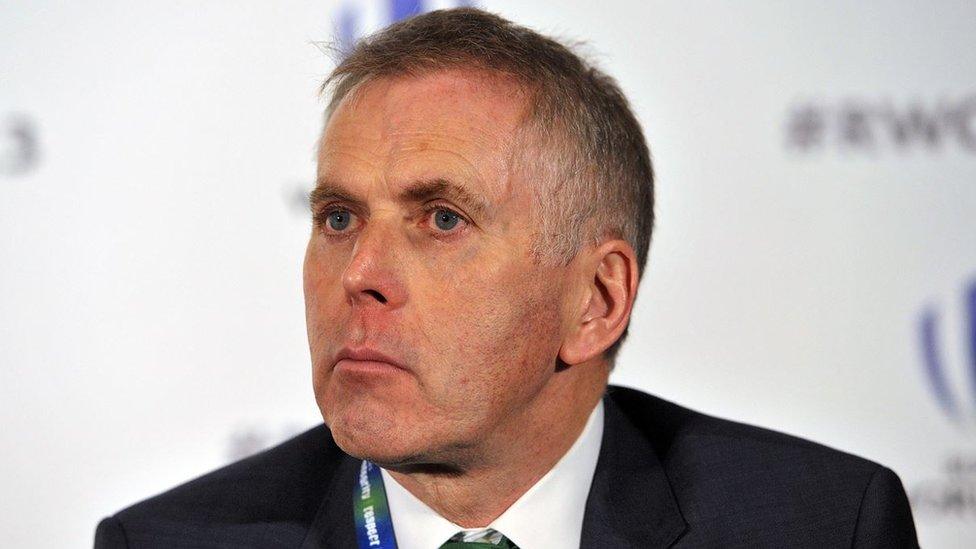Covid inquiry: Gap in early NI response, says top scientist
- Published
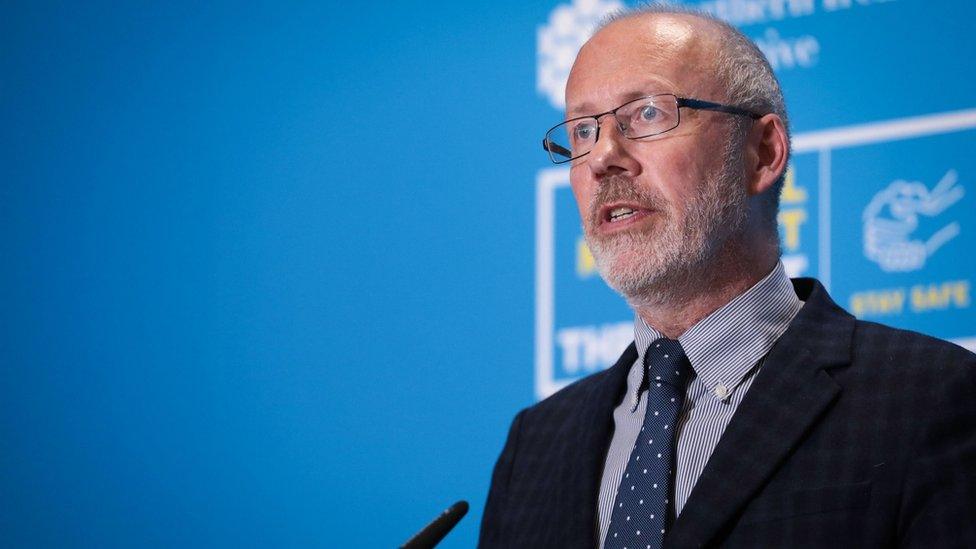
Prof Ian Young was testifying at the UK Covid Inquiry
There was a gap in Northern Ireland's early response to the Covid pandemic, the chief scientific advisor has said.
Prof Ian Young was testifying at the UK Covid Inquiry, which is sitting in Belfast.
He said his part-time role had not been replaced in February and March 2020 while he was on leave.
The first Covid lockdown began on 23 March, the same day Prof Young returned to his role.
That absence meant there was no local health representative attending Sage (Strategic Advisory Group of Experts) meetings.
The Sage group is a committee of scientists responsible for advising meetings on Covid.
Prof Young said there was a lot of catching up to do and it was not until mid-April that he had time to establish a broader group of experts within Northern Ireland.
Significant decisions
He told the inquiry he had not been integrated into the Department of Health's (DoH) initial response to the pandemic as he hadn't been directed to by anyone in the department.
He said it was his expectation that he would be "called on" for his advice when others thought it was "necessary".
When Prof Young returned to his job several significant decisions had already been taken in Northern Ireland with regards to its response to the pandemic.
His evidence was part of week two of the inquiry's sitting in Northern Ireland.
The inquiry was told that, by the end of January 2020, Northern Ireland was aware of two different scenarios provided by the UK government, which outlined the potential impact of massive loss of life as the virus began to take hold around the world.
The inquiry's lead counsel is continuing to look at who exactly was in charge and taking he lead on preparing for the impact of a global pandemic.
Prof Young also said:
With the absence of testing in Northern Ireland, and observing what was happening in England and all over Europe, going into lockdown in March 2020 was the only option
The lack of access to testing "prohibited" Northern Ireland's response to the pandemic
There was limited data available especially around hospital admissions which didn't kick in until April 2020
Advising on policy was often difficult as adopting one decision that supported one sector of the community would simultaneously go against the overall plan of trying to keep the R (rate of transmission) number below one
Both Prof Young and the chief medical officer expressed their concern about the additional relaxation involved in the Eat Out to Help Out policy but were very aware that it would help businesses
Despite national advice of the need for hiring and training 300 to 500 people to work in contact tracing, a different model was undertaken by the Public Health Agency, which hired considerably fewer
Prof Young viewed Ireland as a single epidemiological unit but tit was not possible to proceed in that way as how both jurisdictions collected data was very different
Intervention by ministers ahead of a four-week lockdown in October 2020 was "very robust," but criticism from ministers did not alter Prof Young's advice or analysis
Regarding comments made by the Democratic Unionist Party politician Edwin Poots in October 2020, Prof Young said there was never any epidemiological basis for a minister publicly saying that the spread of the virus was more prevalent in nationalist areas
On the decision to allow people to mix over Christmas, there was "a desire at the end of what had been an extraordinarily difficult year to allow people some degree of mixing". The advice "emphasised the "difficulty" in predicting the impact but that it was "overwhelmingly likely to lead to a significant increase in virus transmission"
Regarding a document sent to Sage, which compared autumn interventions introduced in the four nations, the scientific analysis showed that the decisions and interventions made in Northern Ireland were "very clearly" the most effective in any of the four nations
By the autumn and wave two of the pandemic, "there had been time for a lot more critical opinion to emerge and that included less consistent messaging probably from people in positions of influence"
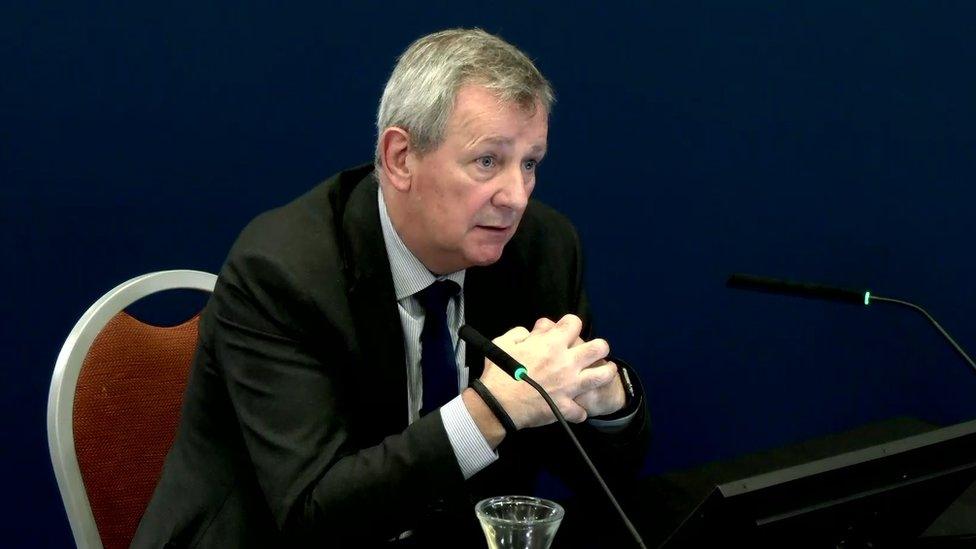
Richard Pengelly is a former permanent secretary at Stormont's Department of Health
Earlier, the top civil servant at the DoH during the pandemic was challenged over who should have taken the lead advising Stormont departments at the start of the crisis.
Richard Pengelly was questioned by inquiry chairwoman Baroness Hallett.
He said his department led the health response, but did not believe it was responsible for taking the lead for other parts of government.
He said his department "cannot dictate or mandate other departments".
Baroness Hallett replied that the department may not be able to "dictate" to other departments, but she suggested "you can lead".
"Forgive me, I don't understand what lead means if it doesn't?" Mr Pengelly asked her.
"As in encouraging others to check that their resilience is better, getting them prepared?" Baroness Hallett replied.
Mr Pengelly suggested that was in fact the role of civil contingencies planners, through Stormont's Executive Office.
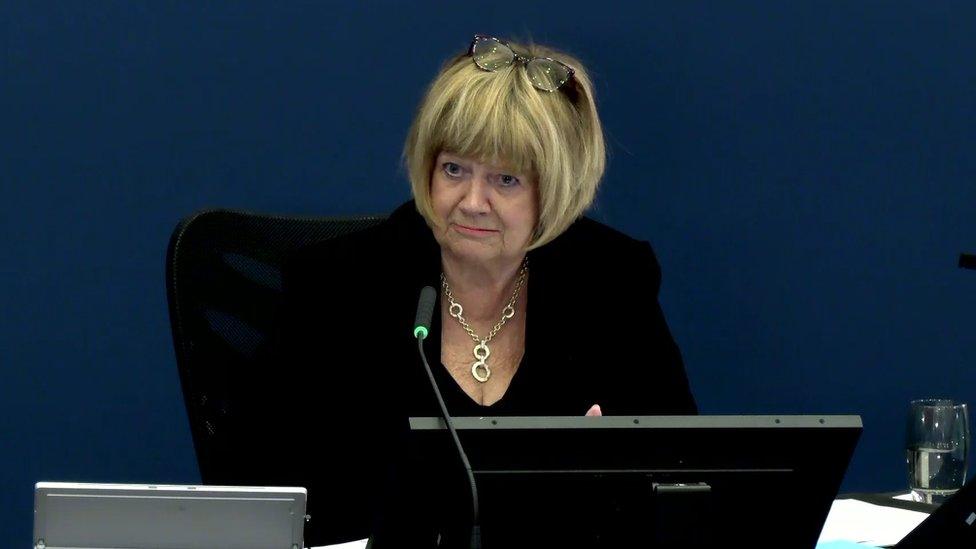
Baroness Hallett questioned why Stormont's Department of Health did not lead cross-departmental pandemic preparations
'Ridiculously long days'
Mr Pengelly also said:
The department felt there was no value in triggering Northern Ireland's emergency response to Covid via the Northern Ireland Central Crisis Management Agency (NICCMA) in February 2020 as it would take people away from other work and it was dealing with an under-resourced system
He had teams of people "working ridiculously long days with no respite at weekends" and any additional work "could have pushed them beyond breaking point".
Northern Ireland relied on modelling work from Great Britain, as there was no capacity or provision here until the return of Northern Ireland's chief scientific adviser from leave at the end of March 2020
It did not occur to him why there was no Covid special advisory group within the DoH
The department was aware visitors from Wuhan in China travelled to Northern Irelandand the Republic at the end of January 2020. He said he had been advised the group was "asymptomatic"
The structure of Northern Ireland's health and social care system meant the workforce was "tired" with numerous workforce vacancies as it entered the pandemic in 2020. Long waiting lists, staffing shortages and a fragile workforce meant the system was already shouldering huge burden as it entered the pandemic
On having the worst hospital waiting lists in the UK in 2018, he agreed with counsel to the inquiry that Northern Ireland was the poorest "performing region in the UK"
The chief medical officer, Sir Michael McBride, did not have an independent role within the department but that his advice did have "an independent aspect to it"
Care homes
Mr Pengelly was also questioned by Peter Wilcock KC, counsel for the NI Covid-19 bereaved families for justice.
Mr Wilcock put it to the former permanent secretary that based on evidence by Eddie Lynch, the commissioner for older people in Northern Ireland, older people had been forgotten about in pandemic planning.
Mr Pengelly accepted that a Covid-19 emergency response strategy, published by the department in March 2020, made no specific mention of the "acutely vulnerable status of older people".
However, he said that at the time the document was published his department understood that the Covid response would include this group, which, he added, it did.
Mr Pengelly was asked by Mr Wilcock if it was surprising the document did not refer to the importance of infection prevention and control measures in the "microenvironment of care homes" in particular.
He responded the document did not get into the "granular detail" across every sector and that there were other areas not mentioned.
"The fact that something is not specifically mentioned in there does not mean that it's not strategically important, and I can't emphasise that point enough," he said.
"Care homes were hugely important to us and particularly the care of all residents within care homes and indeed the staff."
- Published3 May 2024
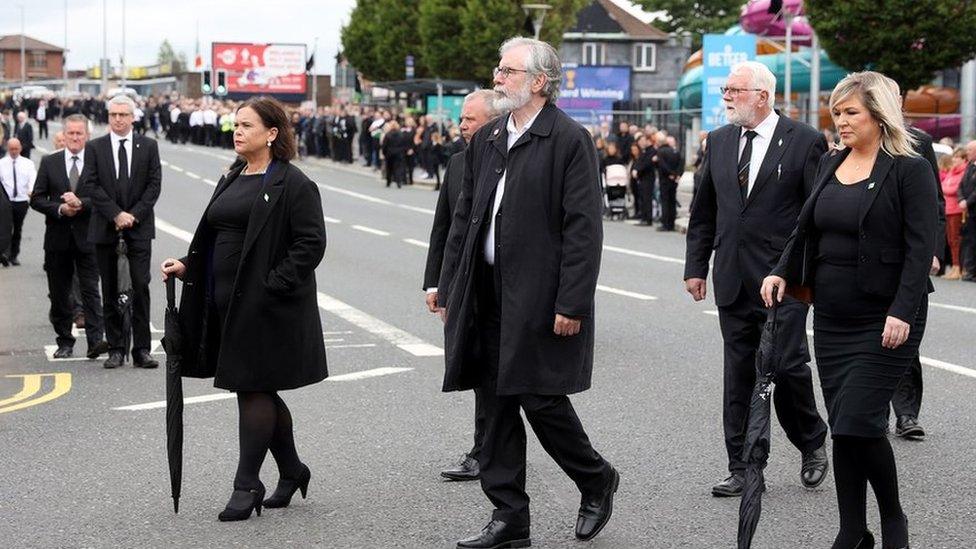
- Published3 May 2024
- Published1 May 2024
